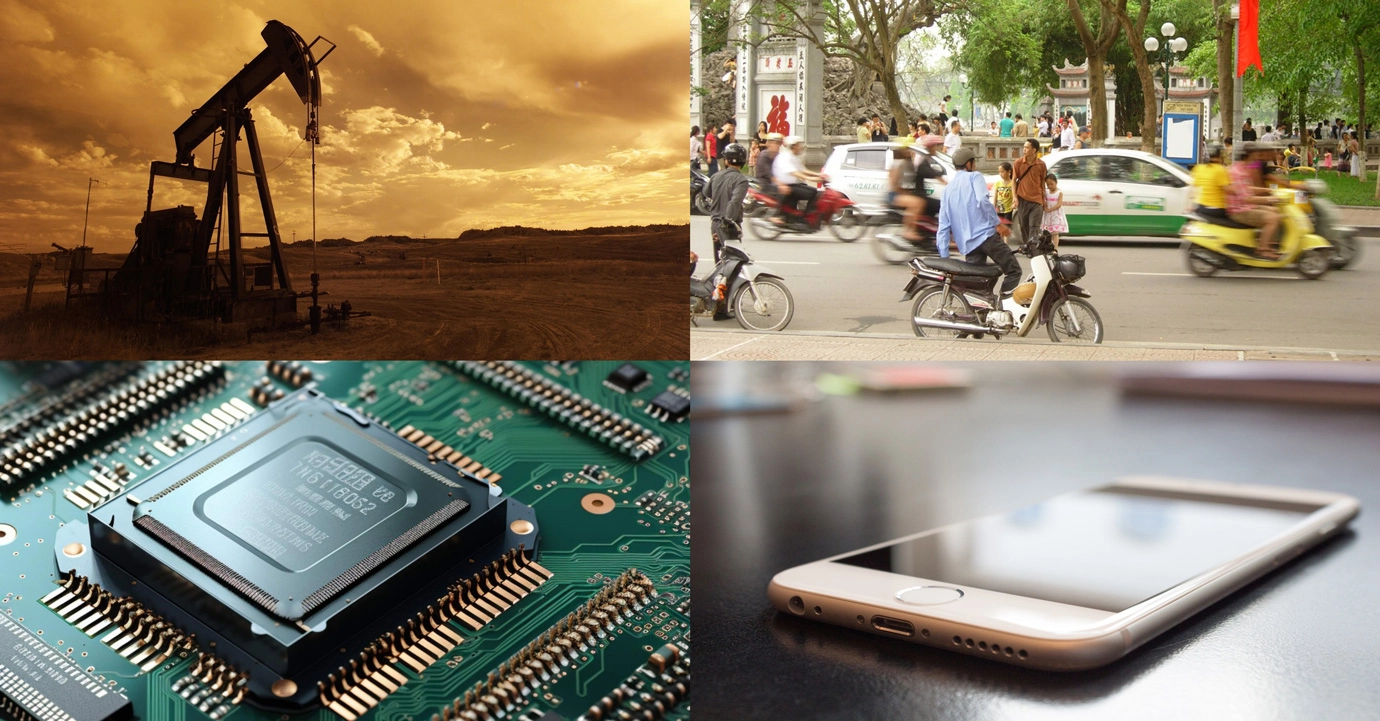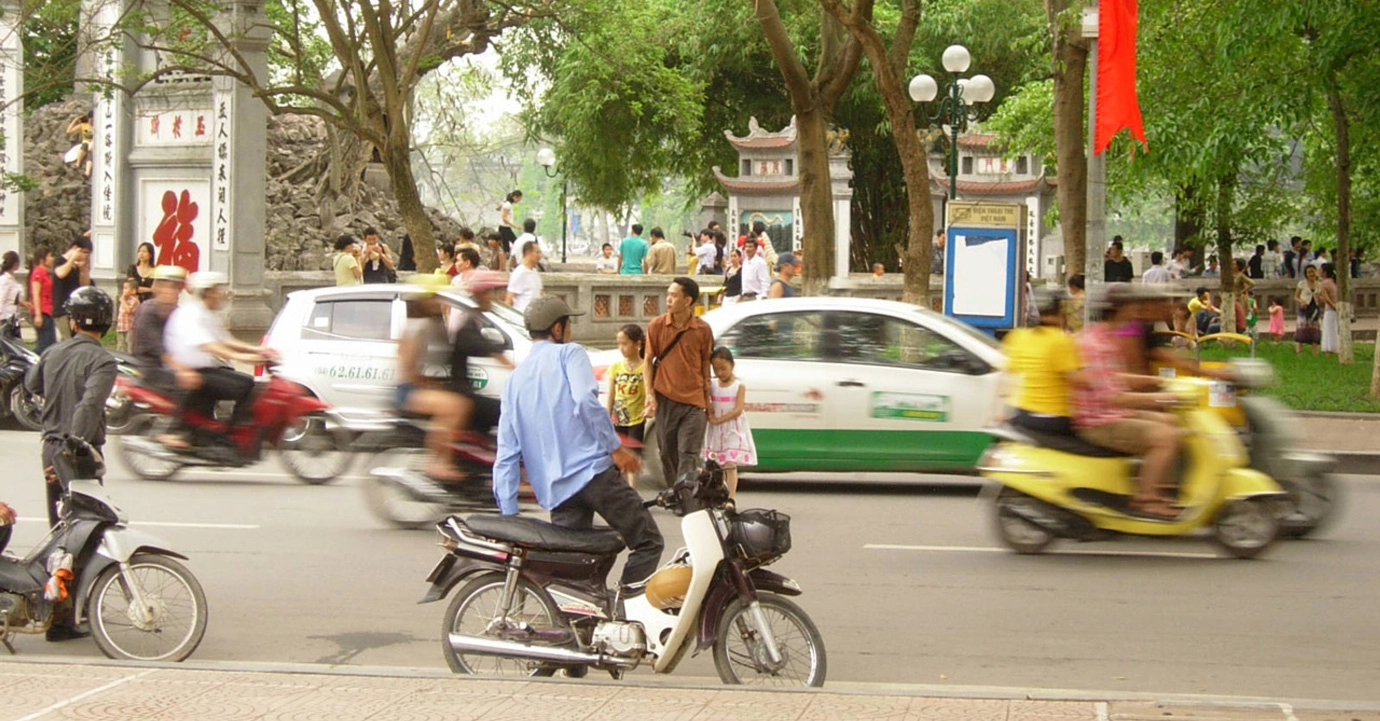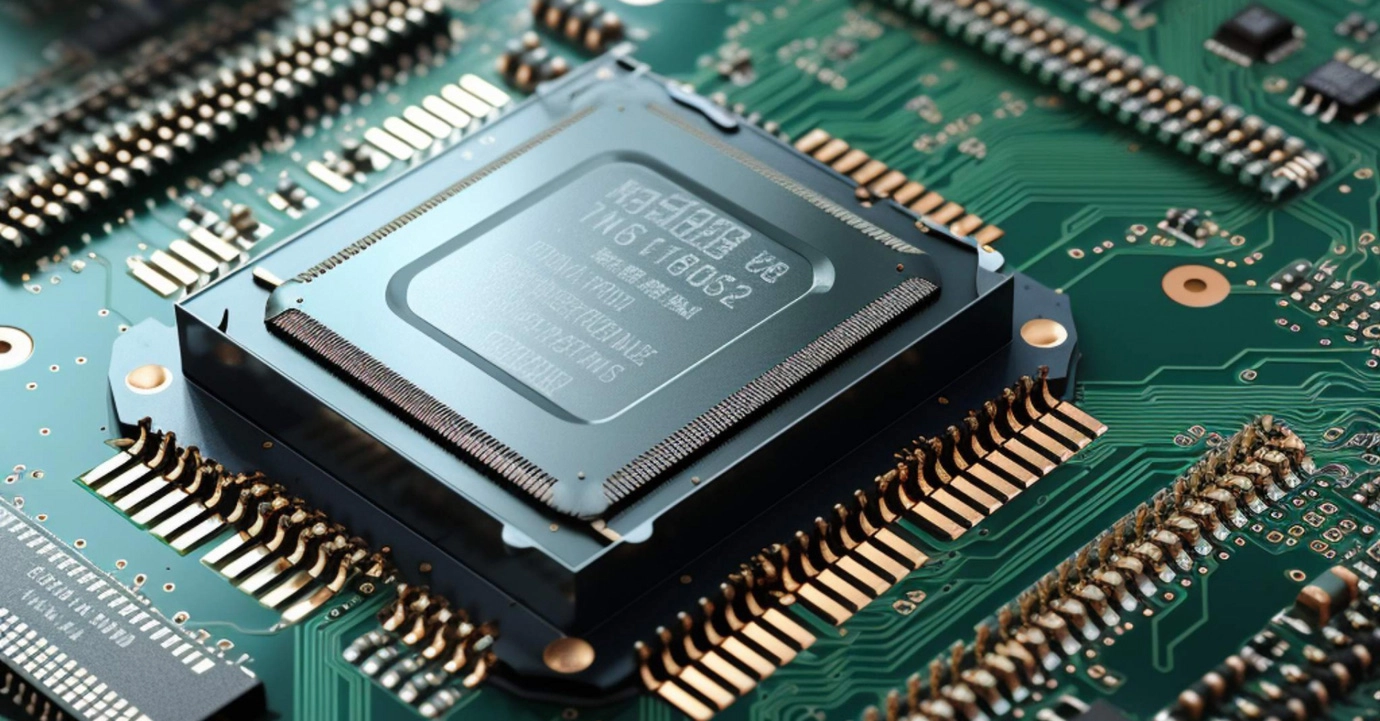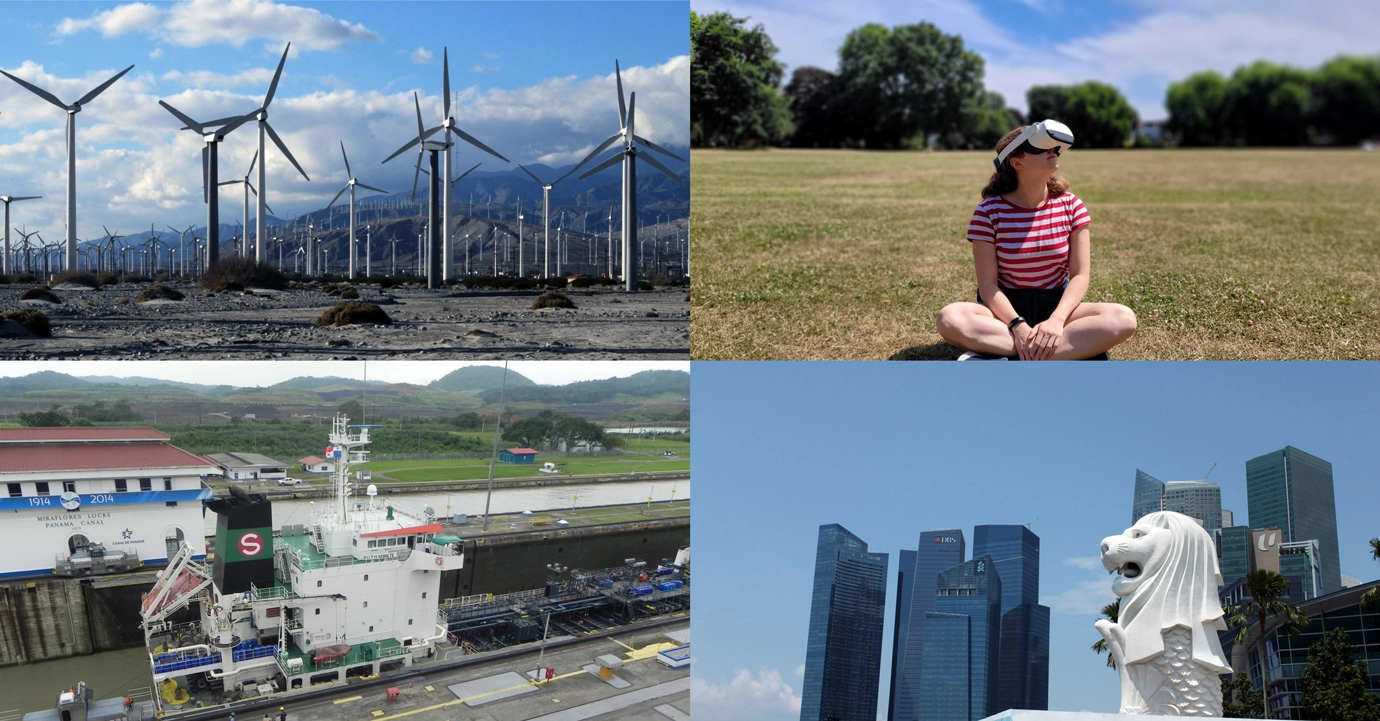Guyana’s Might, Singapore’s Pioneering Move,
Germany’s Semiconductor Industry, and Foxconn’s Transition†

Joshua Kim, Father and Daughters on Hanoi Street;
Circe Denyer, Computer Chip Technology Hardware;
Axelle B, Smartphone (Publicdomainpictures.net)
Update #1: Guyana’s Economic & Diplomatic Might

Claiming to have support from a referendum held in early December, Venezuela President Nicolás Maduro is stepping up his efforts to turn the oil-rich Essequibo region of neighboring Guyana into a Venezuelan state, despite the fact that the two countries’ territorial dispute over Essequibo is being handled by the International Court of Justice. Venezuela’s potential invasion of Guyana—a British colony for nearly 200 years until its independence in 1966—has been a concern since 2015, when billions of barrels worth of oil were discovered in the country.
In response to Venezuela’s aggression, Brazilian President Luiz Inácio Lula da Silva said: “We do not want and we do not need war in South America”. The United States has expressed its commitment to “conduct flight operations with the Guyanese military”. China, which identifies both Venezuela and Guyana as “good friends”, has urged the two countries to settle their territorial dispute through “friendly consultation”. With the intervention of leaders from the Community of Latin American and Caribbean States and the United Nations, President Maduro and Guyanese President Mohamed Irfaan Ali are scheduled to meet tomorrow (i.e., December 14).
Worth noting:
What if tomorrow’s meeting does not produce effective results? Guyana’s economic and diplomatic might will likely cause China to become more involved in helping settle the dispute.
“Guyana’s economic and diplomatic might will likely cause China to become more involved in helping settle the dispute.”
Since oil production began in Guyana in 2019, the country has seen significant economic growth, with its GDP increasing from USD 5.18 billion in 2019 to USD 14.54 billion in 2022. The country’s GDP is projected to grow to USD 29.94 billion in 2028. In June, when Chinese President XI Jinping met with President Ali, while the latter was in China to attend the opening ceremony of the FISU World University Games, the two leaders stressed the importance of their cooperation. Specifically, President Ali pointed out China’s key role in the economic and social development of Guyana and the Caribbean region by, inter alia, providing valuable assistance in developing infrastructure, connectivity, and the domestic health care system.
Guyana’s forthcoming diplomatic strength should also be noted. On January 1, 2024, Guyana, together with Algeria, Sierra Leone, Slovenia, and South Korea, will begin their two-year service as non-permanent members of the 15-member United Nations Security Council. At a time when international conflicts continue to increase, the importance of this body charged with maintaining international peace and security cannot be overstated. Guyana’s vote is valuable to China—a permanent member of the Security Council—in its efforts to help shape the development of the world.
Update #2: China, Vietnam, & Singapore’s Pioneering Move

Uncertainties arising from the Russia-Ukraine and Israel-Hamas wars as well as the Venezuela-Guyana conflict make President Xi’s current state visit to Vietnam even more timely. In the face of these challenges in Europe, the Middle East, and South America, China must forge strong relations with neighboring countries in Asia, a region that provides relative stability to support China’s economic development.
The importance of Vietnam to China was emphasized by WANG Wenbin, spokesperson of China’s Ministry of Foreign Affairs, who stated that both Vietnam and China are “socialist countries” that have been going through transformations in accordance with their respective realities. He called for “[g]reater solidarity, closer friendship and deeper mutually-beneficial cooperation” between the two countries as this is “in the common interests of both sides and conducive to peace, stability and prosperity of the region and the wider world”.
Worth noting:
President Xi’s state visit to Vietnam is expected to lead to more economic collaboration between China and Vietnam, among other achievements. In fact, according to Vietnam’s official data, China’s registered investment in Vietnam from January to November 2023 amounted to USD 8.29 billion, making China the biggest investor in the country. The United States is the 10th largest investor (USD 0.53 billion).
What is interesting is that Singapore is the second largest investor (USD 5.14 billion) in Vietnam. Singapore just announced a pioneering move to participate in a cross-border e-CNY pilot program, through which travelers from Singapore and China will be allowed to use e-CNY for tourism spending in the two countries. One must wonder whether this pilot program is likely to expand soon to cover other countries in the region, including Vietnam, so as to facilitate overseas travel and ultimately facilitate the payment of other business transactions.
Related article:
Update #3: Germany’s Subsidies for the Semiconductor Industry

Just a few months after Germany launched its plan to invest approximately USD 22.15 billion to support the development of its own semiconductor industry in the coming years, German Minister of Finance Christian Lindner has questioned this generous support amidst the country’s ongoing budget crisis. He said, “I’m not convinced that Germany can safeguard its competitiveness, its prosperity, and social security through subsidies in the long run” and urged to also source semiconductors from other countries. Concerns about the government budget grew after Germany’s highest court ruled in November 2023 that a significant part of the government’s funding plan for climate and energy projects was unlawful. This ruling forced the German government to reshuffle its budget to identify new sources of funds to support these projects.
Worth noting:
There are also concerns that Germany’s subsidies for the semiconductor industry are not fair. The Taiwan Semiconductor Manufacturing Company (TSMC) deal to build a new plant in Germany is illustrative. Costing EUR 10 billion in total, the plant is to be owned by TSMC (70%) and TSMC’s major customers in Europe, i.e., Infineon, Bosch, and NXP Semiconductors (10% each). TSMC’s 70% ownership drew criticisms because the company’s investment only amounts to EUR 3.5 billion (i.e., only 35% of the total cost of the plant’s construction for double the ownership stake). Might such perceived unfairness, together with the government’s growing budget concerns, lead Germany to reconsider these subsidies?
“There are also concerns that Germany’s subsidies for the semiconductor industry are not fair.”
Update #4: India’s Gain from Foxconn Boss’s “Loss” in Taiwan

In late November, Terry Gou, Founder of Foxconn, a major manufacturer of Apple’s iPhone, withdrew from Taiwan’s presidential race. Just a few days later, Foxconn announced its plan to invest USD 1.5 billion to expand its operations in India. Does this mark Foxconn’s gradual transition of its key manufacturing hub from China to India?
Worth noting:
Understanding the circumstances under which Terry Gou withdrew from Taiwan’s presidential race may help to clarify Foxconn’s India plan. Terry Gou’s withdrawal occurred merely hours before the deadline for him to formally register as a presidential candidate. Should Gou have continued his run, he would have risked offending both the United States and China. As a presidential candidate, Gou could take away votes that would otherwise go to presidential candidates of the ruling and pro-U.S. Democratic Progressive Party, i.e., Vice President William Lai and HSIAO Bi-khim. To please China, which had already imposed a small fine on Foxconn for allegedly violating certain Chinese tax rules, Guo attempted to help organize a joint ticket between HOU Yu-ih of the Nationalist Party and KO Wen-je of the Taiwan People’s Party in hopes that they might together defeat the Democratic Progressive Party’s candidates. The fact that this effort dramatically collapsed on live TV (and now, the two candidates are running separately) gave Guo an excuse to step aside.
Guo is likely to have learned from this experience and may very well welcome India as Foxconn’s manufacturing hub now, as this move allows himself and Foxconn to avoid being caught again between China and the United States. With its booming economy and work force, India will give Foxconn stability to maintain its position as a strong Apple supplier. Will India be able to seize this opportunity to prove that it has the capacity to become a high-tech manufacturing hub?
† The citation of this article is: The Editorial Board of SINOTALKS®, Guyana’s Might, Singapore’s Pioneering Move, Germany’s Semiconductor Industry, and Foxconn’s Transition, SINOTALKS.COM®, SinoExpress™, Dec. 13, 2023, https://sinotalks.com/sinoexpress/guyana-singapore-vietnam-semiconductor-foxconn.





